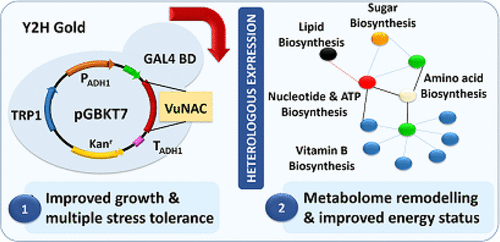当前位置:
X-MOL 学术
›
ACS Synth. Biol.
›
论文详情
Our official English website, www.x-mol.net, welcomes your
feedback! (Note: you will need to create a separate account there.)
Cowpea NAC Transcription Factors Positively Regulate Cellular Stress Response and Balance Energy Metabolism in Yeast via Reprogramming of Biosynthetic Pathways
ACS Synthetic Biology ( IF 3.7 ) Pub Date : 2021-09-01 , DOI: 10.1021/acssynbio.1c00208 Richa Srivastava 1 , Lingaraj Sahoo 1
ACS Synthetic Biology ( IF 3.7 ) Pub Date : 2021-09-01 , DOI: 10.1021/acssynbio.1c00208 Richa Srivastava 1 , Lingaraj Sahoo 1
Affiliation

|
Yeast is a dominant host for recombinant production of heterologous proteins, high-value biochemical compounds, and microbial fermentation. During bioprocess operations, pH fluctuations, organic solvents, drying, starvation, osmotic pressure, and often a combination of these stresses cause growth inhibition or death, markedly limiting its industrial use. Thus, stress-tolerant yeast strains with balanced energy-bioenergetics are highly desirous for sustainable improvement of quality biotechnological production. We isolated two NAC transcription factors (TFs), VuNAC1 and VuNAC2, from a wild cowpea genotype, improving both stress tolerance and growth when expressed in yeast. The GFP-fused proteins were localized to the nucleus. Y2H and reporter assay demonstrated the dimerization and transactivation abilities of the VuNAC proteins having structural folds similar to rice SNAC1. The gel-shift assay indicated that the TFs recognize an “ATGCGTG” motif for DNA-binding shared by several native TFs in yeast. The heterologous expression of VuNAC1/2 in yeast improved growth, biomass, lifespan, fermentation efficiency, and altered cellular composition of biomolecules. The transgenic strains conferred tolerance to multiple stresses such as high salinity, osmotic stress, freezing, and aluminum toxicity. Analysis of the metabolome revealed reprogramming of major pathways synthesizing nucleotides, vitamin B complex, amino acids, antioxidants, flavonoids, and other energy currencies and cofactors. Consequently, the transcriptional tuning of stress signaling and biomolecule metabolism improved the survival of the transgenic strains during starvation and stress recovery. VuNAC1/2-based synthetic gene expression control may contribute to designing robust industrial yeast strains with value-added productivity.
中文翻译:

豇豆 NAC 转录因子通过重编程生物合成途径积极调节酵母中的细胞应激反应和平衡能量代谢
酵母是异源蛋白质重组生产、高价值生化化合物和微生物发酵的主要宿主。在生物工艺操作过程中,pH 波动、有机溶剂、干燥、饥饿、渗透压以及这些压力的组合通常会导致生长抑制或死亡,从而显着限制其工业用途。因此,具有平衡能量-生物能量学的耐压酵母菌株非常希望可持续地提高生物技术生产的质量。我们从野生豇豆基因型中分离出两种 NAC 转录因子 (TF),VuNAC1 和 VuNAC2,在酵母中表达时提高了应激耐受性和生长。GFP 融合蛋白定位于细胞核。Y2H 和报告基因分析证明了具有与水稻 SNAC1 相似的结构折叠的 VuNAC 蛋白的二聚化和反式激活能力。凝胶迁移分析表明,TFs 识别酵母中几个天然 TFs 共享的用于 DNA 结合的“ATGCGTG”基序。VuNAC1/2 在酵母中的异源表达改善了生长、生物量、寿命、发酵效率,并改变了生物分子的细胞组成。转基因菌株赋予了对多种胁迫的耐受性,例如高盐度、渗透胁迫、冷冻和铝毒性。代谢组分析揭示了合成核苷酸、维生素 B 复合物、氨基酸、抗氧化剂、类黄酮和其他能量货币和辅助因子的主要途径的重编程。最后,应激信号和生物分子代谢的转录调节提高了转基因菌株在饥饿和应激恢复期间的存活率。基于 VuNAC1/2 的合成基因表达控制可能有助于设计具有增值生产力的稳健工业酵母菌株。
更新日期:2021-09-17
中文翻译:

豇豆 NAC 转录因子通过重编程生物合成途径积极调节酵母中的细胞应激反应和平衡能量代谢
酵母是异源蛋白质重组生产、高价值生化化合物和微生物发酵的主要宿主。在生物工艺操作过程中,pH 波动、有机溶剂、干燥、饥饿、渗透压以及这些压力的组合通常会导致生长抑制或死亡,从而显着限制其工业用途。因此,具有平衡能量-生物能量学的耐压酵母菌株非常希望可持续地提高生物技术生产的质量。我们从野生豇豆基因型中分离出两种 NAC 转录因子 (TF),VuNAC1 和 VuNAC2,在酵母中表达时提高了应激耐受性和生长。GFP 融合蛋白定位于细胞核。Y2H 和报告基因分析证明了具有与水稻 SNAC1 相似的结构折叠的 VuNAC 蛋白的二聚化和反式激活能力。凝胶迁移分析表明,TFs 识别酵母中几个天然 TFs 共享的用于 DNA 结合的“ATGCGTG”基序。VuNAC1/2 在酵母中的异源表达改善了生长、生物量、寿命、发酵效率,并改变了生物分子的细胞组成。转基因菌株赋予了对多种胁迫的耐受性,例如高盐度、渗透胁迫、冷冻和铝毒性。代谢组分析揭示了合成核苷酸、维生素 B 复合物、氨基酸、抗氧化剂、类黄酮和其他能量货币和辅助因子的主要途径的重编程。最后,应激信号和生物分子代谢的转录调节提高了转基因菌株在饥饿和应激恢复期间的存活率。基于 VuNAC1/2 的合成基因表达控制可能有助于设计具有增值生产力的稳健工业酵母菌株。











































 京公网安备 11010802027423号
京公网安备 11010802027423号